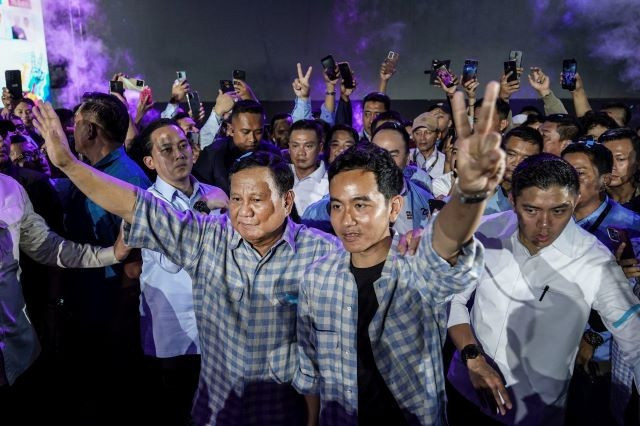News
Peaceful elections, high voter turnouts no guarantee of Indonesian democracy
Tenggara Strategics March 19, 2025 Celebration: Presidential candidate Prabowo Subianto (left, front row) and running mate Gibran Rakabuming Raka wave to their supporters on Feb. 14, 2024 at the Senayan Sports Hall in Jakarta. (Antara/Dhemas Reviyanto) (Antara/Dhemas Reviyanto)
Celebration: Presidential candidate Prabowo Subianto (left, front row) and running mate Gibran Rakabuming Raka wave to their supporters on Feb. 14, 2024 at the Senayan Sports Hall in Jakarta. (Antara/Dhemas Reviyanto) (Antara/Dhemas Reviyanto)
Indonesia in 2024 held a series of elections that went off relatively peacefully and saw large voter turnout to give popular legitimacy to those in power today, yet the country saw its ranking in the global democracy index decline last year.
Indonesia fell three positions to 59th out of 167 countries surveyed in 2024 by the Economic Intelligence Unit (EIU) which runs the annual index. Among what the report defined as “flawed democracies”, within Southeast Asian nations Indonesia is behind Malaysia (44th), Timor-Leste (46th) and the Philippines (51st), but ahead of Thailand (63rd) and Singapore (68th). Norway and New Zealand top the list, Myanmar and Afghanistan are at the bottom.
Indonesia, which often bills itself as the world’s third-largest democracy, can take consolation that the United States and France fell into the same category of flawed democracies although they ranked higher. The EIU report said that despite a record election year in 2024, with more than half of the global population going to the polls, the overall index recorded a democratic decline, falling to its lowest since the index began in 2016.
That Indonesia’s democracy has been backsliding in the last 10 years has already been widely recognized in spite of the five-yearly general elections. The EIU study, which breaks the scoring into four components, spells out where Indonesia is going wrong.
From a possible maximum score of 10 for each of the four components that define the trends in democracy, Indonesia scores lowest in political culture (5) and civil liberty (5.29) but highest in functioning government (6.79) and political participation (7.22).
Indonesia is a classic example of what an illiberal democracy looks like, an electoral democracy without the various freedoms and culture of an open society to support and ensure its sustainability. Going by the EIU democracy index, Indonesia had seen better days. In 2014, it ranked 44th, ahead of all its Southeast Asian neighbors except Timor-Leste.
Responding to the EIU report, Human Rights Minister Natalius Pigai said the declining state of democracy reflected the performance of the government of Joko “Jokowi” Widodo, who was in office in 2014-2024, and cannot be attributed to President Prabowo Subianto, who took charge only in October.
This is hardly comforting when there are strong indications that under the former Army general Indonesia is continuing its slow march back toward authoritarianism. There is the concern at the increasing military role in civic life reminiscent of the era of the Soeharto regime.
Prabowo polled nearly 60 percent of the vote to beat the two other candidates in the presidential race that saw voter turnout exceeding 80 percent, which would be the envy of any democracy where voting is voluntary and not mandatory. His popularity has remained even after his first 100 days in office, with independent surveys putting his public approval ratings around 80 percent. No one can doubt Prabowo’s popular legitimacy to govern.
The low scores for both civil liberty and political culture in the EIU study underscore the increasingly shrinking space for public discourse and for dissenting opinions and the breaking down of democratic political institutions to provide effective checks and balances.
Following on Jokowi’s style of government, Prabowo has expanded his coalition government to include just about all the major political institutions that matter. All but one of the eight political parties in the House of Representatives are in his government. He has also listed the business groups and conservative Islamic groups, as well as the military and the police, in his government. The judiciary has long been broken thanks to Jokowi’s intervention.
Now that power is increasingly concentrated in his hands, there is hardly any force powerful enough to stop Prabowo from getting what he wants.
And this is more evidenced by the expected swift and easy passage of the revision of the Indonesian Military (TNI) Law currently being deliberated in the House.
When passed, as it most likely will be, the new law will formally allow active military officers to take up any civilian posts without having to retire from service. There is also a clause proposing to allow military institutions to run businesses.
All of this is happening with little pushback from public opinion, partly reflecting Prabowo’s immense popularity, but also that the government has control over the internet and social media. Dissenting voices on the internet are either shut down or shouted down by the massive noise from a cyber army and influencers deployed by the government.
It is too early to judge where Prabowo is taking Indonesia going by the EIU global democracy index. Lest we forget, this is a man who won the 2024 elections fair and square, adhering to the rules of the game, on his fourth attempt.
But the signals he is sending since he took over evince little confidence about the future of Indonesia’s democracy. If anything, things are about to get worse.
What we've heard
In response to The Economist's research, the government has pushed a narrative that questions the study's methodology. “The measurement tools and methods are said to be outdated,” a politician familiar with the issue said.

